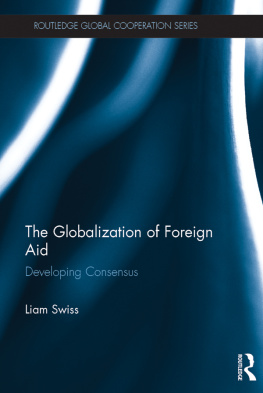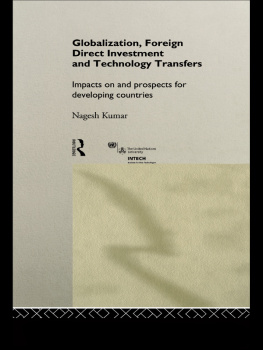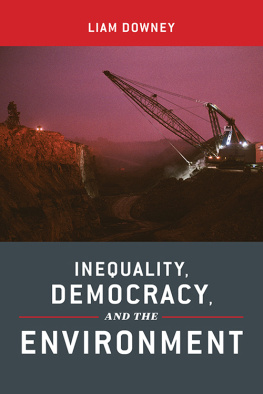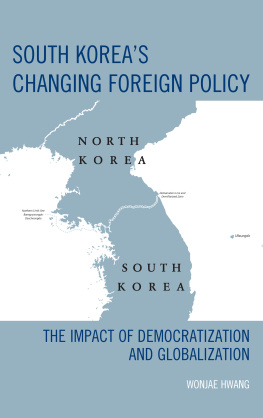This long-awaited book provides a compelling account of why foreign aid donors engage in herd behaviour and how the process plays out in specific cases. In it, Liam Swiss makes a very insightful and nuanced contribution to the literature on foreign aid and policy diffusion.
Stephen Brown, School of Political Studies,
University of Ottawa, Canada
Based on sustained personal and professional experience, Liam Swiss provides a meticulous analysis of the many forces that produce convergence in international development policy, norms and priorities. Swiss manages the rare combination of compelling detail, clarity, and theoretical innovation.
Emma Mawdsley, Reader in Human Geography,
University of Cambridge, UK
Combining mixed-methods research with his insights as a former international aid worker, Swiss offers a compelling explanation of how donors get stuck in inflexible approaches to development. This books gives us a glimpse into both the dark side of global consensus, and how to break free of it.
Elizabeth Heger Boyle, Professor of Sociology,
University of Minnesota, USA
This book is an indispensable contribution to our understanding of how aid works. Swiss deftly explores the challenges faced by the development industry today and blazes new trails into the global politics of bilateral assistance. I know of no other comparative study of aid agencies that takes a sociological approach as sophisticated as this.
Jeffrey T. Jackson, Associate Professor of Sociology,
University of Mississippi, USA, and author of The Globalizers: Development Workers in Action
The Globalization of Foreign Aid
Why do aid agencies from wealthy donor countries with diverse domestic political and economic contexts arrive at very similar positions on a wide array of aid policies and priorities? This book suggests that this homogenization of policy represents the effects of common processes of globalization manifest in the aid sector. Drawing on both quantitative and qualitative analysis of policy adoption, the book argues that we need to examine macro-level globalizing influences at the same time as understanding the micro-level social processes at work within aid agencies, in order to adequately explain the so-called emerging global consensus that constitutes the globalization of aid.
The book explores how global influences on aid agencies in Canada, Sweden, and the United States are mediated through micro-level processes. Using a mixed-methods approach, the book combines cross-national statistical analysis at the global level with two comparative case studies which look at the adoption of common policy priorities in the fields of gender and security. The Globalization of Foreign Aid will be useful to researchers of foreign aid, development, international relations and globalization, as well as to the aid policy community.
Liam Swiss is Associate Professor of Sociology at Memorial University of Newfoundland in St. Johns, Canada.
Routledge Global Cooperation Series
This series develops innovative approaches to understanding, explaining and answering one of the most pressing questions of our time how can cooperation in a culturally diverse world of nine billion people succeed?
We are rapidly approaching our planets limits, with trends such as advancing climate change and the destruction of biological diversity jeopardising our natural life support systems. Accelerated globalisation processes lead to an ever growing interconnectedness of markets, states, societies, and individuals. Many of todays problems cannot be solved by nation states alone. Intensified cooperation at the local, national, international, and global level is needed to tackle current and looming global crises.
Series editors:
Tobias Debiel, Claus Leggewie and Dirk Messner are Co-Directors of the Kte Hamburger Kolleg/Centre for Global Cooperation Research, University of Duisburg-Essen, Germany. Their research areas are, among others, Global Governance, Climate Change, Peacebuilding and Cultural Diversity of Global Citizenship. The three Co-Directors are, at the same time, based in their home institutions, which participate in the Centre, namely the German Development Institute/Deutsches Institut fr Entwicklungspolitik (DIE, Messner) in Bonn, the Institute for Development and Peace (INEF, Debiel) in Duisburg and the Institute for Advanced Study in the Humanities (KWI, Leggewie, former Director, now retired) in Essen.
www.routledge.com/Routledge-Global-Cooperation-Series/book-series/RGC
Titles:
Integrating Sustainable Development in International Investment Law
Normative Incompatibility, System Integration and Governance Implications
Manjiao Chi
Moral Agency and the Politics of Responsibility
Challenging Complexity
Edited by Cornelia Ulbert, Peter Finkenbusch, Elena Sondermann and Tobias Debiel
Public Participation in African Constitutionalism
Edited by Tania Abbiate, Markus Bckenfrde and Veronica Federico
Region-Making and Cross-Border Cooperation
New Evidence from Four Continents
Edited by Elisabetta Nadalutti and Otto Kallscheuer
The Globalization of Foreign Aid
Developing Consensus
Liam Swiss
First published 2018
by Routledge
2 Park Square, Milton Park, Abingdon, Oxon OX14 4RN
and by Routledge
711 Third Avenue, New York, NY 10017
Routledge is an imprint of the Taylor & Francis Group, an informa business
2018 Liam Swiss
The right of Liam Swiss to be identified as author of this work has been asserted by him in accordance with sections 77 and 78 of the Copyright, Designs and Patents Act 1988.
All rights reserved. No part of this book may be reprinted or reproduced or utilised in any form or by any electronic, mechanical, or other means, now known or hereafter invented, including photocopying and recording, or in any information storage or retrieval system, without permission in writing from the publishers.
Trademark notice: Product or corporate names may be trademarks or registered trademarks, and are used only for identification and explanation without intent to infringe.
British Library Cataloguing-in-Publication Data
A catalogue record for this book is available from the British Library
Library of Congress Cataloging-in-Publication Data
A catalog record for this book has been requested
ISBN: 978-1-138-56984-3 (hbk)
ISBN: 978-0-203-70404-2 (ebk)
Typeset in Times New Roman
by Out of House Publishing
To Nicole, Noel, and Evie
Contents
Given this book is about how the individual power and agency of development workers shapes the globalization of foreign aid policy, the research was only possible through the willingness of development workers and donor officials in Canada, Sweden, and the United States to talk to me about their work and experiences. I am greatly indebted to their tolerance and support of the research process, and apologetic for the time it has taken for me to tell their story. In addition, my field-work in Sweden was helped immeasurably by the wonderful Petersson-Hkeberg family, who opened their homes and provided great assistance to my efforts during my stay.
I am grateful for the financial support of the Social Sciences and Humanities Research Council of Canada during this projects initial stages, and of the Kte Hamburger Kolleg/Centre for Global Cooperation Research at the Universitt Duisburg-Essen, where I was a Senior Fellow at the time of its completion.













